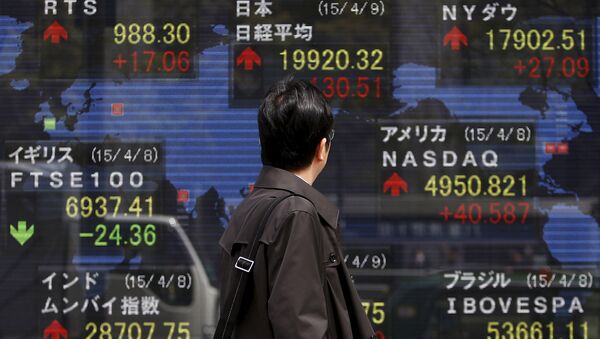Kristian Rouz – Shockingly disappointing US economic growth news in Q1 arrived in the early hours of Wednesday, becoming the determining factor on Wall Street later that day, with major indices retreating. In the Asia-Pacific region, the decision of the Bank of Japan (BoJ) to abstain from expanding quantitative easing despite ever-faltering inflation and Beijing’s acknowledgement of the recently sharpened risks in the mainland economy, added to regional bearishness on Thursday. The European markets are expected to decline on Thursday, as the euro’s strengthening against the dollar is seen as harmful for regional manufacturers.
A more significant than anticipated start-year slowdown in the US took its toll on the US stocks during Wednesday’s trading. The Dow Jones Index shed 0.4%, the S&P 500 retreated 0.4% and the Nasdaq Composite dipped 0.6%.
Wall Street trading opened in the red as stock futures had declined overnight, only extending losses in the afternoon on the news from the US Department of Commerce that US GDP added only 0.2% in Q1 as compared to the consensus-expected 1% and 2.2% growth in Q4 2014.
Consequently, the dollar declined against its major peers as soft data buried any hope for a June Fed base interest hike; a September hike is now more likely. The euro rose 1.3% to $1.1118, a serious hit to the Eurozone’s export-oriented manufacturing. As a result, the European markets shed value overnight, and are bound to extend losses on Thursday. In Frankfurt, the DAX index shed 3.2%, in Paris, the CAC 40 lost 2.6%, while Stoxx Europe 600 slid 2.2%.
Volatility in the US markets will increase in the next several months, at least until the Fed interest hike timing issue resolves itself. US corporate earnings were mixed in Q1, though better than expected, but the slower growth against a stronger dollar background make the situation foggy.
“The economic data needs to improve,” David Seaburg of New York-based financial services firm Cowen and Co. said. “It’s just not where it needs to be … it’s scary.”
The Fed policy meeting ended Wednesday, and the policy statement offers nothing new. The slowdown is explained by certain ‘transitory factors’, as a stronger dollar has been pushing US multinationals out of foreign markets, and the whole production-side in the US economy is readjusting towards the domestic market. Fed chair Janet Yellen did not do her traditional press-conference as there’s nothing much to add, as the US monetary authority has explicitly decided to wait and see what happens in Q2.
In the Asia-Pacific region, the main event on Thursday was the decline in Japanese stocks after the BoJ decided to hold off further monetary easing. Exporters suffered the most, with Honda Motors sliding 6.4%, Shin-Etsu Chemical losing 6.3%, Takeda Pharmaceutical declining 2.4%. The biggest winner on Nikkei was the electronics-maker TDK Corp, adding 5.5% as its profits surpassed estimates.
“I’m not sure that the incoming data is bad enough to change [my] basic view that growth [is] improving,” Masaaki Kanno of the Tokyo branch of JPMorgan Chase said.
The broader Topix Index slid 1.8%, possibly the greatest decline in over three months, with 31 out of 33 sectors posting losses. The BoJ governor Haruhiko Kuroda said there was no need to expand stimulus as Japanese inflation is expected to pick up as soon as energy prices increase. Japanese manufacturing contracted only 0.3% in March month-on-month compared to the expected loss of 2.3%, which is good news, partially in terms of the BoJ's easing decision.
The MSCI Asia Pacific Index slid 0.5% in Tokyo, thus posting a 6.4% advance in April. Korea’s Kospi Index shed 0.4%. Australia’s S&P/ASX 200 Index slid 0.3%, while New Zealand’s NZX 50 Index rose 0.3%.
Crude prices added 2.7% to $58.58/bbl.



